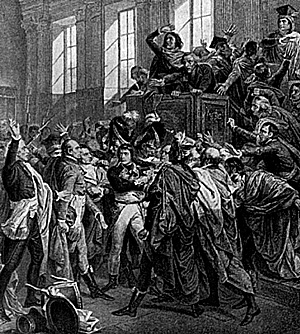
Napoleon Seizes Control of France
General Bonaparte's career almost came to an abrupt end when he initially used the wrong tactics in the political arena. He attempted to address the legislative body of the French government (shown at left in the color painting by Ray Rubin), but was shouted down and then committed a serious error by replying with a veiled threat. Angry deputies rushed him (see other illustration) and the sudden crush of bodies temporarily stunned him. Historian James Arnold noted: "Bonaparte staggers on the precipice of oblivion."
Dissatisfaction with the corrupt Directory, in part due to its inability in 1799 to defend Napoleon's conquests in Italy, had grown to such a level that savvy Parisians expected the government to be toppled. Speculation ran rife as to whom among the Republic's generals might be the "sword" that backed the coup. Many cast an expectant eye toward the recently arrived and much-feted hero of Italy and Egypt.
But first, Napoleon had domestic troubles to deal with. While he was in the Middle East he was informed that his wife, Josephine, had been having an affair. Isolated in Egypt and powerless to deal with these reports of infidelity, Napoleon retaliated by taking Pauline Foures, the wife of one of his lieutenants, as his mistress. Napoleon resolved to divorce Josephine as soon as he returned -- only desperate pleading by Josephine saved their marriage.
Reconciled to Josephine but no longer the naive lover of his younger days, Napoleon entered the cynical business of politics. Chosen by Director Sieyes to be a part of Sieyes plot to overthrow Napoleon's former patron, Barras, and the other Directors, Napoleon, with the help of his brother Lucien, successfully dissolved the Assembly. This was known as the Coup of 18 and 19 Brumaire (9-10 November 1799), and certainly was not among his finest moments as a leader. At the height of the crisis, Napoleon made a clumsy speech in front of the legislative body of elders that nearly botched the entire process. Then he appeared before the Council of Five Hundred and was physically attacked, shouted down as a tyrant, and driven from the hall. Only Lucien's intervention with the grenadiers, who had been assembled for the coup, charged in and dispersed the legislators, managed to win the day. A new government was formed that night, headed by three consuls: Napoleon, Sieyes, and Roger Ducos.
In the days after Brumaire, Napoleon usurped the coup initiated by Sieyes to become First Consul of France. Napoleon emerged as the de facto head of the government with near dictatorial powers. His political legitimacy, however, depended upon his ability to finish the war with the allied nations of the Second Coalition which were still threatening to invade France. Something had to be done quickly.
More Napoleon: Introductory Guide
-
Introduction
Prejudice and Pride
Napoleon in Military School
The Young Artillerist's Double Life
Revolution & Opportunity
Women's Fashion During the Revolution
The Siege of Toulon
Napoleon & Josephine
Women's Fashion during the Directory
Fame & Glory: Italy
Fame & Glory: Egypt
Saviour or Usurper
Battle of Marengo
Civil Achievments
Enlightened Despot or Tyrant
Napoleon's Siblings
The Dawn of Gastronomy
Haydn and Beethoven
Women's Fashion during the Empire
Napoleon's Other Women
The Mashalate and Imperial Eagle
History's Greatest General?
Back to Table of Contents -- Napoleon #17
Back to Napoleon List of Issues
Back to MagWeb Master Magazine List
© Copyright 2001 by Napoleon LLC.
This article appears in MagWeb (Magazine Web) on the Internet World Wide Web.
The full text and graphics from other military history magazines and gaming magazines are available at http://www.magweb.com
Order Napoleon magazine direct